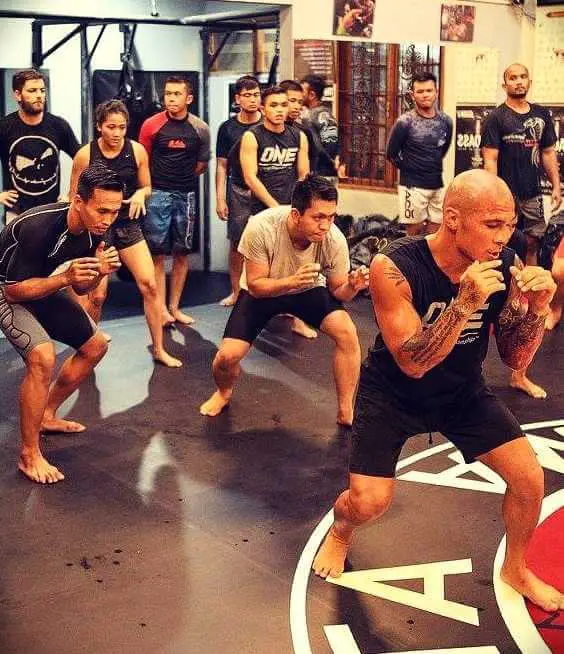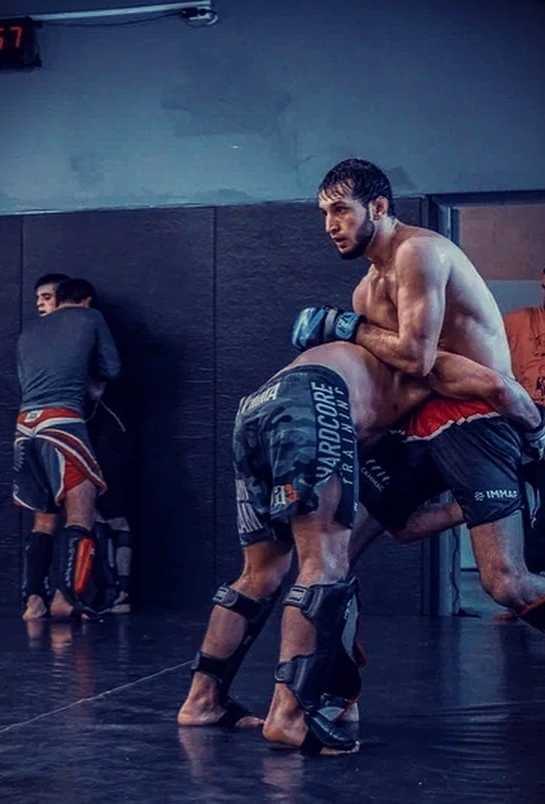Short answer? If you wanted to, you could start fighting straight away – that is, if you don’t care about winning or staying in one piece.
But would that be the wisest choice? Not really. So, let’s take it step-by-step.
What is your entry-level?
The first question you need to ask yourself is: ‘What is my entry-level?’. In other words, are you already experienced in a particular martial art?
If that is the case, you could start from that solid base that you’ve been working on for a while, your core martial art.
It could be wrestling, boxing, kickboxing, Brazilian jiu-jitsu, etc. It doesn’t matter which one, as long as you can call yourself (more or less) a specialist in that art.
Steadily move on to develop the areas of your game you’re less proficient at, or, you could simply train MMA.
Ten years ago that first path was probably the one most accessible to folks. But much has changed over the past decade. Nowadays, countless gyms offer MMA classes.

That being said,
What are the main aspects you should consider before stepping into the cage?
Start with cardio! Let’s talk about cardio.

Under the amateur MMA unified rules, all amateur bouts consist of no more than three 3-minute rounds with a 1-minute rest period in between rounds.
Your cardio needs to be strong enough to get you through those three rounds. Also, bear in mind that your heart rate should be low enough to allow you to think and fight in a relaxed state.
If your cardio starts to give up, then it is all over, you will start to panic, and your opponent will immediately smell blood in the water.
Remember: the gym is not the same as the cage. Competing is different. Sparring should become a key component of your training if you’re seriously committing to getting a fight.
If you’re not gaining the upper hand in any of your sparring sessions, reconsider your approach, you may need some more time to hone your skills.
What should you be working on?
- Feints
- Setups
- Clinch
- Submissions
- Basic combinations
This is MMA, so you should be striving to develop a well-rounded game:
- On your feet
- On the ground
- In the clinch
Work on your defense

Also, and I can’t stress this enough, work-on-your-defense. Drill defensive exercises again and again (and again). This has been said before: the name of the game is hit and don’t get hit.
People ask themselves all the time: ‘how much should I train?’ Since overtraining is a real risk here, I would recommend you to listen to your body: if it hurts more than it should, then take a day off to rest.
Some fighters are able to train every single day of the week without skipping a beat. If that isn’t you, be realistic.
It’s better to get in 4 good training sessions a week than 7 mediocre ones. Your end goal might be to eventually go pro.
How many amateur fights do you need before you go pro?
I don’t think there is a specific number. It will come down to the promotion, your skill level, and your record.
Different promotions have different standards, so some won’t even consider taking you in unless you have displayed a high level of skill and a good, strong fight record. There will always be room to improve your skills.
However, if you can’t cut it in a strong MMA gym, then maybe you should get in some more training to perfect your skills first.
A good way to test this could be to spend some time in one of the top-tier gyms and see how you fare against other pros.
Let’s say you have ten amateur fights under your belt, with an undefeated record, or maybe you lost one or two fights. If you legitimately faced some good competition, then you could certainly consider going pro.
On the flip side, if you have a losing record (4-6, etc.), maybe you may want to wait a bit more in order to get more experience before you take that next step.
2 pieces of advice
I leave you with two additional pieces of advice.
1. Don’t step into the cage unless you feel confident enough
Once you feel confident enough, ask for a fight. But make sure it’s a legitimate establishment. You don’t want to go to the hole in the wall where the ref will not care if you’re getting punished if things go south.
2. You don’t want your first fight to be your last
Your coach is -or at least should be- a key part of this process. If he says you’re not ready to get in the cage, listen to his advice.
You might be fighting the urge to get your first bit of experience for a while, but you may end up thanking him later. Coaches lookout for a fighter’s longevity, and their job is to protect you. Listen to them.





